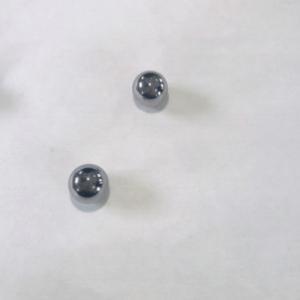

Add to Cart
36.5125mm(1-7/16"), Hot Sale Solid Stainless Steel Metal Ball For
Bearing
Introduction
Stainless steel balls are usually produced by the stainless steel forging process. At this stage, the commonly used stainless steel balls are 201, 302, 304, 316, 316L, 420, 440C.
Stainless steel is often divided into martensitic steel, ferritic steel, austenitic steel, austenitic-ferritic (duplex) stainless steel and precipitation hardening stainless steel according to the state of organization. In addition, it can be divided into: chromium stainless steel, chromium nickel stainless steel and chromium manganese nitrogen stainless steel, etc.
Main features
Weldability, Polishing performance, Heat resistance, Corrosion
resistance
a.The main factors affecting polishing performance are as follows:
① Surface defects of raw materials. Such as scratches, pitting,
pickling, etc.
②Material problems of raw materials. If the hardness is too low, it
is not easy to polish during polishing (BQ is not good), and if the
hardness is too low, orange peel will easily appear on the surface
during deep drawing, which will affect the BQ. BQ with high
hardness is relatively good.
③After deep drawing, small black spots and RIDGING will appear on
the surface of the area where the deformation is extremely large,
which will affect the BQ.
b.Heat resistance refers to the ability of stainless steel to maintain its excellent physical and mechanical properties at high temperatures.
c.When the number of chromium atoms in the steel is not less than 12.5%, the electrode potential of the steel can be changed abruptly, from a negative potential to a positive electrode potential. Prevent electrochemical corrosion.
Structural composition
The corrosion resistance of stainless steel decreases with the
increase of carbon content. Therefore, the carbon content of most
stainless steels is low, the maximum does not exceed 1.2%, and the
ωc (carbon content) of some steels is even lower than 0.03% (such
as 00Cr12 ). The main alloying element in stainless steel is Cr
(chromium). Only when the Cr content reaches a certain value, the
steel has corrosion resistance. Therefore, stainless steel
generally has a Cr (chromium) content of at least 10.5%. Stainless
steel also contains elements such as Ni, Ti, Mn, N, Nb, Mo, Si, and
Cu.
Compared with carbon steel, austenitic stainless steel has the
following characteristics:
1) High resistivity, about 5 times that of carbon steel.
2) Large linear expansion coefficient, 40% larger than carbon
steel, and as the temperature increases, the value of the linear
expansion coefficient increases accordingly.
3) Low thermal conductivity, about 1/3 of carbon steel.
304 stainless steel is widely used in curtain walls, side walls, roofs and other construction purposes, but in severely corrosive industries or marine atmospheres, it is best to use 316 stainless steel.
| Material | Steel grade | Density(kg/dm3) | Hardness |
Stainless steel ball Not hardened | 304 / 304L ball | 7,95 | 25-39 HRC |
| 316 / 316L ball | 7,95 | 25-39 HRC | |
| 430 / 430F ball | 7,73 | 75-95 HRB | |
| 904 ball | 7,98 | 65-95 HRB | |
Stainless steel ball Hardened | 420C ball | 7,70 | 52-60 HRC |
| 440C ball | 7,75 | 58-64 HRC |
